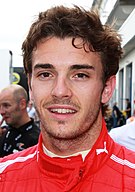The 2014 FIA Formula One World Championship was the 68th season of FIA Formula One motor racing. It featured the 65th Formula One World Championship, a motor racing championship for Formula One cars, recognised by the sport's governing body, the Fédération Internationale de l'Automobile (FIA), as the highest class of competition for open-wheel racing cars. The season commenced in Australia on 16 March and concluded in Abu Dhabi on 23 November. In the nineteen Grands Prix of the season, a total of eleven teams and twenty-four drivers competed for the World Drivers' and World Constructors' championships. The season was the first Formula One season since 1994 to see an accident with fatal consequences as Jules Bianchi died on 17 July 2015 after spending nine months in a coma following a crash at the 2014 Japanese Grand Prix.[1][2][3]
In 2014, the championship saw the introduction of a revised engine formula, in which the 2.4-litre V8 engine configuration—previously used between 2006 and 2013—was replaced with a new formula specifying a 1.6-litre (97.6 cu in) turbocharged V6 engine that incorporated an energy recovery system into its build. The 2014 calendar featured substantial revisions from the 2013 season; the Russian Grand Prix (held the first time in a century) was held at the Sochi Autodrom, and the Austrian Grand Prix was revived with the race held at the Red Bull Ring in Spielberg. The Indian Grand Prix was put on hiatus before being removed from the schedule entirely along with the Korean Grand Prix.
Sebastian Vettel started the season as defending World Drivers' Champion having secured his fourth consecutive Drivers' title the previous season at the 2013 Indian Grand Prix. His team, Infiniti Red Bull Racing, also started the season as defending World Constructors' Champions having secured its fourth consecutive Constructors' title last season at the same Grand Prix in which its lead driver secured his title.
Mercedes driver Lewis Hamilton won his second World Drivers' Championship - his first for Mercedes, having previously won his first title in 2008 with McLaren and becoming only the second driver to win the title for the Silver Arrows since Juan Manuel Fangio did so in 1955 - with 384 points and 11 victories ahead of his teammate, Nico Rosberg with 317 points and 5 victories, ending Red Bull's 4 year championship dominance (which started in 2010). Rosberg also won the inaugural FIA Pole Trophy having amassed a total of 11 pole positions over the course of the season. Mercedes secured their first World Constructors' Championship as a full works constructor in Russia, and finished the season with 701 points, 296 points ahead of Infiniti Red Bull Racing. The season also saw the first three wins of Daniel Ricciardo, who finished third in the championship for Infiniti Red Bull Racing. Meanwhile Ricciardo's team mate and defending champion Vettel endured a winless season making the German driver the first defending champion since Jacques Villeneuve in 1998 to have this unwanted distinction and last to date, as of 2024[update].[4]
- ^ "Formula One driver Jules Bianchi in critical condition after horror Japanese Grand Prix crash". ABC News. ABC. 5 October 2014. Retrieved 5 October 2014.
- ^ DiZinno, Tony (18 July 2015). "Jules Bianchi dies at age 25, his family confirms". NBC Sports. Archived from the original on 19 July 2015. Retrieved 18 July 2015.
{{cite web}}: CS1 maint: unfit URL (link) - ^ "Formula One: French driver Jules Bianchi dies aged 25, nine months after Japan crash". The Straits Times. 18 July 2015.
- ^ "Winless 2014 does not bother Sebastian Vettel". ESPN UK.



